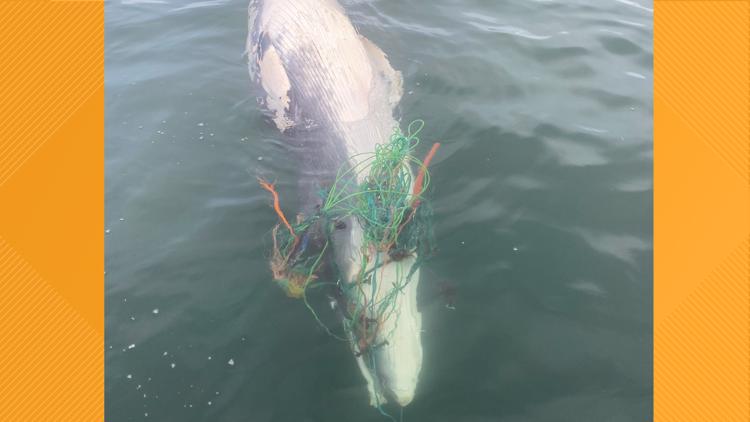RHODE ISLAND, USA —
Organizations from Maine down to Virginia that assist stranded whales have been seeing an increase in unusual mortalities over the past couple of years.
Members of the Animal Rescue Program of Mystic Aquarium recovered the body of a young minke whale said to be entangled in fishing gear off Point Judith in Rhode Island on Monday. Upon arriving at the scene, it was discovered the whale had died before its discovery.
The U.S. Coast Guard and Rhode Island Department of Environmental Management helped bring the body back to shore in Wakefield, RI. They were then joined on the beach by Long Island’s Atlantic Marine Conservation Society to assist in the necropsy that will determine the cause of death.
The whale was a young male minke whale. It was reported that the carcass was a code 3, which means advanced decomposing. This makes it difficult for the team to conclude anything definitively, meaning entanglement cannot be confirmed as the cause of death at this time.
Samples from the whale’s body will be sent to a pathologist for further analysis, which may not come back for a number of weeks, rescue team member Sarah Callan told FOX61.
“It's technically under investigation, why are all these animals from this species dying so frequently right now. And so that's what we're trying to figure out,” Callan said. “It's like a little forensics puzzle. You have to figure out why these animals are dying, and you use that information to educate people. Hopefully you can change, potentially change, laws or whatnot in the future to help mitigate those deaths.”
The Mystic Aquarium scientists stress that the death of this minke whale is a clear and stark example of the need to prioritize investment in conservation research. Experts in the field continue to fight the tide of extinction for cetacean species disappearing from the oceans.
“The tragic loss of this animal is a sad but important reminder of the dire circumstances many cetaceans currently face,” President and CEO of Mystic Aquarium Dr. Stephen M. Coan said in a statement. “The environment where these whales live is changing rapidly due to the impact of human activity and climate change. We must make every effort now to ensure a future for these incredible species.”
According to data from the National Oceanographic Atmospheric Administration, there have been over 100 Minke whale strandings reported since 2017.
Other whale species, such as North Atlantic right whales, which are on the brink of extinction, and humpback whales are vulnerable to strandings and mortality events as well. NOAA reported these populations have had over 150 reported strandings since 2016.
“The waters are changing so drastically it's pretty amazing and a little scary,” Callan said. “We're seeing a lot of different fish species in this area. Whales might be hanging around longer because of that when in the past they might just pass through. Now they're subjected to whatever threats might be in the waters here if they're hanging around longer.”
While whale mortality rates seem dire, there is hope. Callan said network members, researchers, and fisheries have been working together to figure out ways to mitigate deaths.
“I've seen a lot of strides made already. I think just having the conversations and talking and working through what some challenges might be, you know, everyone working together. I'm very hopeful for the future but it's a race against time. That's why I say one organization is not going to be able to solve this problem, it's only going to get solved if we're all working together,” Callan said.
Mystic Aquarium isn’t limited to marine mammal rescue response and mortality investigations. They also study beluga whales on-site at the Arctic Coast habitat, which is currently home to eight belugas. The Aquarium stated that by gathering information in this controlled setting, scientists hope to uncover more information about why threatened wild populations of belugas and other whales are steadily declining.
Callan has been a part of the Animal Rescue Program for about six years, but the program has been running since 1975. They rescue, rehabilitate, and release sick, injured, and stranded marine animals along 1,000 miles of the Northeastern coastline throughout Connecticut, Rhode Island, Fishers Island, and New York. The team responds to an average of 150 hotline calls each year.
Mystic Aquarium’s Animal Rescue Program also collects valuable data that is used by the National Marine Fisheries Service as the basis for rulemaking. This includes gear regulations, shipping lane designations, and more to protect marine mammals.
In the case of this minke whale, a cause of death will not be determined for several weeks.
The Aquarium encourages anyone who finds a stranded or injured marine mammal or sea turtle to call the 24-hour Animal Rescue Hotline at 860.572.5955 x107.
---
HERE ARE MORE WAYS TO GET FOX61 NEWS
Download the FOX61 News APP
iTunes: Click here to download
Google Play: Click here to download
Stream Live on ROKU: Add the channel from the ROKU store or by searching FOX61.



